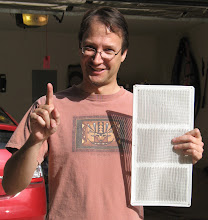First, to me, the definition of "efficiency" is the accomplishing of a given task fully and completely but with less use of energy than the way the task was accomplished previously. For example, if the task is to move 2 people from point A to point B, using a smaller vehicle than before to carry said people will typically result in the task being performed more efficiently, in that the task is completely performed, but less fuel was burned to accomplish it.
There is a similar concept called "conservation", which does not stipulate necessarily that the exact same task be performed, but simply that energy not be used unnecessarily. For example, to look at our example from a conservation mindset, one might ask some questions before one decides how to move the people from point A to point B:
- How far is it from point A to point B, and what mode of transport is appropriate for this distance?
- What is the goal of moving 2 people from A to B? Is there another way to accomplish this goal that does not involve moving people at all?
In this blog, I have focused much more on the "efficiency" mindset, in that it is the least amount of change from the way things are done today. There should be no great mental hurdle for people to understand that doing the same thing in almost the same way, but using less energy while doing it, is a great thing. Thus, living in a house with air conditioning and heating is not questioned, but the amount of energy those systems use and how they use it is questioned, analyzed, and improved.
However, the conservation mindset allows the possibility of even greater improvements. For example, consider air conditioning from the conservation point of view. This point of view asks the question: "What is the point of conditioning the roughly 20,000 cubic feet of air in my house, day in and day out, for about 5 months every year? What am I trying to accomplish? Is there a less energy-intensive way to accomplish this goal?"
As it turns out, the main point of conditioning 20,000 cubic feet of air every day is to make my roughly 2.5 cubic feet of body more comfortable. Is it possible that there is a way to make that body more comfortable without using all that energy? Certainly, in the winter when the picture is reversed, and I want to warm that 2.5 cubic feet of body, I can put warm clothes over the 2.5 cubic feet part of the problem, and save a lot of energy! As an aside, that works well in the winter, because of course, our bodies are quite active producers of heat, so slowing the flow of that heat from the body produces excellent results.
Writing the above, I am reminded of the fine progress the German people have made on energy efficient houses in the cold. In fact, it looks like we are beginning to adopt some of those strategies here. I particularly enjoy the fact that these houses are so efficient as to recognize that you can even capture the heat from the air that naturally escapes the house by planning to have it escape through a heat exchanger, so that the heat is transferred from the outgoing stale air to the incoming fresh air, saving energy even as the house is ventilated with what would have been cold outside air. That strikes me as the product of a conservation mindset, although a lot of the rest of the Passivhaus construction (super thick insulation, multipane windows, etc.) probably falls more under the rubric of extreme energy efficiency, a sort of "if R-20 insulation is good, R-60 insulation is better" approach.
At any rate, it seems to this humble blogger that the combination of the tame but disciplined approach of energy efficiency, along with the potentially more radical questioning approach of conservation yields the most powerful punch against our nefarious enemy, out-of-control energy use. Food for thought along those lines: if I have tripled the cooling efficiency of my house (and I have) using only "mild" efficiency techniques, what could be accomplished with a full conservation mindset? Out-of-the-box suggestions and discussions welcome!
Looking forward to end-of-summer numbers soon, and perhaps analysis updates to follow. Until then, be efficient and conservation minded!


Reflective insulationIts such as you read my thoughts! You appear to grasp a lot approximately this, such as you wrote the book in it or something. I feel that you can do with a few % to force the message house a bit, however other than that, this is wonderful blog. An excellent read. I’ll certainly be back.
ReplyDelete